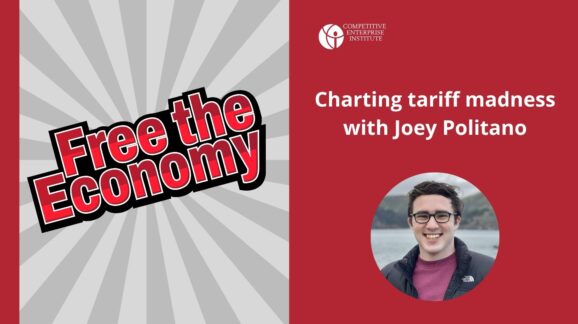There are two main areas in which Congress can enact meaningful reform. The first is to rein in regulatory guidance documents, which we refer to as “regulatory dark matter,” whereby agencies regulate through Federal Register notices, guidance documents, and other means outside standard rulemaking procedure. The second is to enact a series of reforms to increase agency transparency and accountability of all regulation and guidance. These include annual regulatory report cards for rulemaking agencies and regulatory cost estimates from the Office of Management and Budget for more than just a small subset of rules.
In 2019, President Trump signed two executive orders aimed at stopping the practice of agencies using guidance documents to effectively implement policy without going through the legally required notice and comment process.
Featured Posts

Blog
An executive order to make freedom mandatory
The White House Office of Management and Budget’s (OMB) new “Streamlining the Review of Regulatory Actions” memorandum signals a potentially transformative shift in Washington’s…

Blog
Free the Economy podcast: Charting tariff madness with Joey Politano
In this week’s episode we talk about changes in consumer credit, disappearing fast-food jobs in California, and six things the climate movement…

Forbes
Regulation Renovation: The Executive Order To Make Deregulation Permanent
The White House Office of Management and Budget’s new Streamlining the Review of Regulatory Actions memorandum signals a preferential stance toward deregulation, urging…
Search Posts
Blog
Bush Auto Bailout Illegal, Bailout Supporter Admits
Clinton Administration Labor Secretary Robert Reich, who supports bailing out the Detroit automakers (whose unionized workers are paid $70 an hour), nevertheless points out…
Blog
GM-Chrysler Merger Likely Blocked by Antitrust
General Motors & Chrysler could be strengthened by a merger, an option that wouldn't cost taxpayers a dime. But, the idea has been pushed aside,…
Blog
Mortgage Madness
Here is a letter I fired to the Wall Street Journal: December 17, 2008 Editor, The Wall Street Journal 200 Liberty Street New…
News Release
White House Auto Bailout a Recipe for Failure
Normal 0 false false false MicrosoftInternetExplorer4 Normal 0 false false false MicrosoftInternetExplorer4 /* Style Definitions */ table.MsoNormalTable {mso-style-name:"Table Normal"; mso-tstyle-rowband-size:0; mso-tstyle-colband-size:0; mso-style-noshow:yes; mso-style-parent:"";…
Blog
How Do Regulations Stack Up as a Small Firm Grows?
Tomorrow, electric utilities and green groups team up at the National Press Club to ask for billions of new spending on what they term energy…
Blog
Credit Card Price Controls Harm Consumers
The Wall Street Journal editorial got it exactly right: The Federal Reserve cut rates to historic lows Tuesday, but today it…
Staff & Scholars

Clyde Wayne Crews
Fred L. Smith Fellow in Regulatory Studies
- Business and Government
- Consumer Freedom
- Deregulation

Ryan Young
Senior Economist
- Antitrust
- Business and Government
- Regulatory Reform

Fred L. Smith, Jr.
Founder; Chairman Emeritus
- Automobiles and Roads
- Aviation
- Business and Government

Sam Kazman
Counsel Emeritus
- Antitrust
- Automobiles and Roads
- Banking and Finance

Marlo Lewis, Jr.
Senior Fellow
- Climate
- Energy
- Energy and Environment